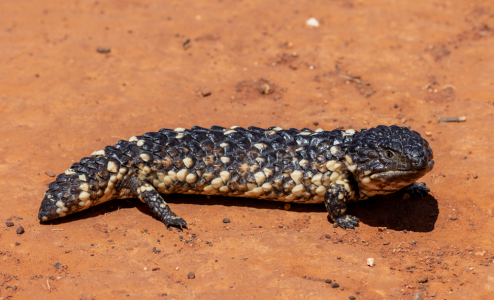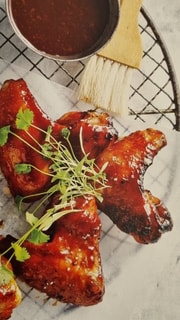New study exposes wildlife smuggling: 170 Australian reptile species sold overseas
By
Gian T
- Replies 6
Australia is renowned for its unique and diverse wildlife, with many species found nowhere else.
This distinction, however, has made Australian reptiles highly sought after in the international exotic pet trade, leading to a dark and illegal practice: wildlife smuggling.
A recent investigation has uncovered the shocking lengths smugglers will go to export these creatures, including hiding them in socks and chocolate boxes.
The study, led by Sebastian Chekunov from the University of Adelaide, revealed that 170 native Australian reptile and amphibian species are being sold overseas, 33 of which are appearing on the international market for the first time.
‘You could get a pair of blue tongue [lizards] for $250 domestically, but they're about 28 times the value overseas,’ she said.
‘For a quick, easy grab from the wild, there's quite a high profit to be made.’
This suggests a recent and ongoing illegal export activity, despite Australia's ban on the commercial export of all live native animals since 1982.
The research team gathered data using public databases, government seizure records, overseas trade shows, pet store websites, reptile forums, social media, and web-scraping software.
The findings were alarming, indicating a thriving black market for Australian wildlife.
One of the most coveted species is the shingleback lizard, which can fetch up to $25,000 for a breeding pair at overseas reptile expos.
Dr Phoebe Meagher, Wildlife Conservation Officer at Taronga Zoo in Sydney, was not surprised by the findings.
She has seen shinglebacks and other native reptiles stuffed into plush toys, Pringles containers, and other inconspicuous items to evade detection.
Conditions during smuggling are often so poor that many animals do not survive the journey.
However, the potential profit from a single sale is so high that smugglers consider the loss of several animals an acceptable risk.
For example, blue tongue lizards, which might sell for $250 domestically, can be worth 28 times more on the international market.
Many of these animals are taken directly from the wild, as species like shinglebacks do not breed well in captivity.
‘[Poachers] will grab them, put them in a bag and put them in their car,’ Dr Meagher said.
‘They often will then take those animals to another person who then has a whole mix of wildlife, usually in their house, and they're the people that...are sending them overseas.’
Once abroad, the restrictions on trading Australian animals are limited, and smugglers exploit this by forging documents to claim the animals were bred in captivity.
‘That's a massive loophole that criminals, particularly overseas, are taking advantage of.’ she added.
To combat this illegal trade, Taronga Zoo's Forensic team has developed innovative tools, such as a handheld X-ray fluorescence (XRF) device that can analyse elements in a reptile's scales to determine whether it was raised in captivity or taken from the wild.
Additionally, ongoing work is being done to develop AI screening programs to detect concealed animals in postal parcels.
Despite these efforts, the scale of the problem could be more manageable.
Data from the Department of Climate Change, Energy, and the Environment indicates that over 800 smuggled animals were intercepted in the last 18 months, but many more likely go undetected.
‘Here in Australia, it's a multi-million dollar criminal industry. We're seeing hundreds of thousands of reptiles being smuggled out of Australia annually…and we're only looking at postal pathways,’ Dr Meagher explained.
‘Even the people that work in the industry are only aware of the tip of the iceberg.’
In other animal news, a community post from Mosman, a wealthy Sydney suburb, raised concerns about a pair of non-native hedgehogs spotted in the area, triggering worries about invasive species.
Residents suggested sending the hedgehogs to Taronga Zoo, but their current location still needs to be discovered, and neither the zoo nor the poster has provided further updates. You can read more about it here.
 How can communities help stop wildlife smuggling and support conservation? Do you think current measures are effective, and what more should be done? Let us know in the comments below.
How can communities help stop wildlife smuggling and support conservation? Do you think current measures are effective, and what more should be done? Let us know in the comments below.
This distinction, however, has made Australian reptiles highly sought after in the international exotic pet trade, leading to a dark and illegal practice: wildlife smuggling.
A recent investigation has uncovered the shocking lengths smugglers will go to export these creatures, including hiding them in socks and chocolate boxes.
The study, led by Sebastian Chekunov from the University of Adelaide, revealed that 170 native Australian reptile and amphibian species are being sold overseas, 33 of which are appearing on the international market for the first time.
‘You could get a pair of blue tongue [lizards] for $250 domestically, but they're about 28 times the value overseas,’ she said.
‘For a quick, easy grab from the wild, there's quite a high profit to be made.’
This suggests a recent and ongoing illegal export activity, despite Australia's ban on the commercial export of all live native animals since 1982.
The research team gathered data using public databases, government seizure records, overseas trade shows, pet store websites, reptile forums, social media, and web-scraping software.
The findings were alarming, indicating a thriving black market for Australian wildlife.
One of the most coveted species is the shingleback lizard, which can fetch up to $25,000 for a breeding pair at overseas reptile expos.
Dr Phoebe Meagher, Wildlife Conservation Officer at Taronga Zoo in Sydney, was not surprised by the findings.
She has seen shinglebacks and other native reptiles stuffed into plush toys, Pringles containers, and other inconspicuous items to evade detection.
Conditions during smuggling are often so poor that many animals do not survive the journey.
However, the potential profit from a single sale is so high that smugglers consider the loss of several animals an acceptable risk.
For example, blue tongue lizards, which might sell for $250 domestically, can be worth 28 times more on the international market.
Many of these animals are taken directly from the wild, as species like shinglebacks do not breed well in captivity.
‘[Poachers] will grab them, put them in a bag and put them in their car,’ Dr Meagher said.
‘They often will then take those animals to another person who then has a whole mix of wildlife, usually in their house, and they're the people that...are sending them overseas.’
Once abroad, the restrictions on trading Australian animals are limited, and smugglers exploit this by forging documents to claim the animals were bred in captivity.
‘That's a massive loophole that criminals, particularly overseas, are taking advantage of.’ she added.
To combat this illegal trade, Taronga Zoo's Forensic team has developed innovative tools, such as a handheld X-ray fluorescence (XRF) device that can analyse elements in a reptile's scales to determine whether it was raised in captivity or taken from the wild.
Additionally, ongoing work is being done to develop AI screening programs to detect concealed animals in postal parcels.
Despite these efforts, the scale of the problem could be more manageable.
Data from the Department of Climate Change, Energy, and the Environment indicates that over 800 smuggled animals were intercepted in the last 18 months, but many more likely go undetected.
‘Here in Australia, it's a multi-million dollar criminal industry. We're seeing hundreds of thousands of reptiles being smuggled out of Australia annually…and we're only looking at postal pathways,’ Dr Meagher explained.
‘Even the people that work in the industry are only aware of the tip of the iceberg.’
In other animal news, a community post from Mosman, a wealthy Sydney suburb, raised concerns about a pair of non-native hedgehogs spotted in the area, triggering worries about invasive species.
Residents suggested sending the hedgehogs to Taronga Zoo, but their current location still needs to be discovered, and neither the zoo nor the poster has provided further updates. You can read more about it here.
Key Takeaways
- Australian reptiles, including shingleback lizards, are being illegally smuggled overseas for sale in the exotic pet trade, fetching high prices.
- A study from the University of Adelaide found that 170 native species are being sold internationally, with 33 species appearing on the market for the first time, indicating recent smuggling activities.
- Smugglers utilise various methods to transport these animals, including hiding them in socks, chocolate boxes, and other disguises, which often result in the animals' deaths during transit.
- Efforts to combat this illegal trade include new technologies like handheld X-ray devices to determine if reptiles were taken from the wild and AI programs to detect concealed animals in postal parcels.








